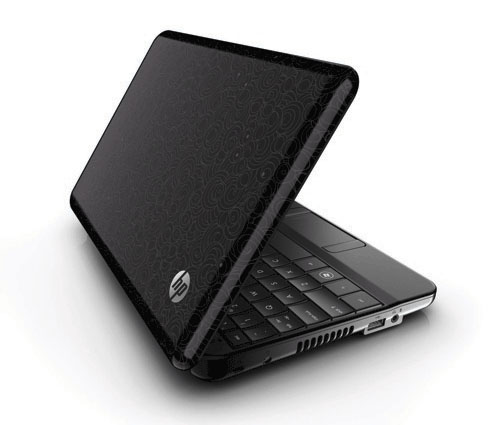
The idea of buying a subsidized netbook PC with built-in 3G mobile access might seem like a nifty way to stay in touch with colleagues and friends on the go…and AT&T is hoping consumers will act on that initial feeling when it offers up an HP Mini 110 netbook PC for $199 beginning next week. AT&T is subsidizing a bit of the cost of the netbook to make it more appealing to consumers, but it’s important to bear in mind that the netbook pricing only applies with a new two-year service plan, and those run at least $35 per month.
As netbooks go, the HP Mini 110 has a few things to comment it: a 10.1-inch display, Windows 7, Wi-Fi, and of course integrated access to AT&T’s 3G network. The system runs Windows 7 and comes with HP QuickSync to handle automatic synchronization of files, mail, contacts, and more with a home or work PC when the user brings it back and pops it on to the same Wi-Fi network. Otherwise, the HP Mini 110 is a fairly normal netbook, offering a 160 GB hard drive, integrated webcam, an Intel Atom processor, and a rather slim 1 GB of RAM.
However, the service plans are where AT&T will make its money: AT&T’s DataConnect plans including a $35/month option for up to 200 GB of data trader, or a $60/month plan that supports 5 GB of data transfer. Over the course of two years, that’s an additional $840 to $1,440 users will be paying to use an underpowered portable machine on AT&T’s 3G network. That solution may be appropriate for some people, but others would be better off purchasing a standalone 3G modem (with approximately the same service plan pricing) and using it with any mainstream, big-screen, or ultra-portable system they pleased—even a netbook—rather than being locked into an HP Mini 110.
AT&T will begin offering the HP Mini 110 netbook with 3G access beginning November 22 for $199—after mail-in rebate via an AT&T Promotion Card.
Editors' Recommendations
- AT&T now makes you pay even more for its fastest 5G speeds
- T-Mobile just set another 5G speed record
- T-Mobile still has the fastest 5G, but its rivals are catching up
- The 5G speed race is over and T-Mobile has won
- T-Mobile’s 5G is still unmatched — but have speeds plateaued?


